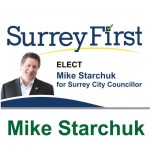Posts Tagged ‘Surrey City’
73 % of Voters Believe Surrey is Better Today Than Nine Years Ago
The research company that successfully called close elections in Alberta and Ontario says Surrey First mayoral candidate Linda Hepner leads Doug McCallum and Barinder Rasode among decided Surrey voters, and that 73 per cent of voters believe their city is better today than it was nine years ago.
Innovative Research Group’s Greg Lyle said his firm’s survey puts Linda Hepner at 40 per cent support among decided voters, McCallum at 33 and Rasode at 22. The telephone poll, which took place October 6-12, also said that reducing crime was the most important issue at 36 per cent, followed by keeping property taxes low at 16 per cent. Other issues included reducing traffic congestion, more open government, reducing spending and attracting jobs. The survey noted that about one-third of Surrey voters are undecided.
Commissioned by Surrey First, the Innovative Research survey also has Linda Hepner leading McCallum and Rasode in terms of “net favorable” results, with Rasode coming out ahead of McCallum in this important category. The “favourable” question asks voters to rate candidates on a scale ranging from strongly favourable to strongly unfavourable. Linda Hepner has a net favourable rating among Surrey voters of 25 per cent, Rasode has 15 per cent and McCallum has just 2 per cent. After nine years in office, outgoing Surrey First Mayor Dianne Watts has a net favourable rating of 63 per cent.
“Dianne Watts’ legacy in Surrey is a big factor among voters because people feel good about her and their city,” said Lyle. “One of the most interesting things about the race in Surrey is just how many voters like the direction their city is taking, and how much they tie that feeling to their outgoing mayor and the team she’s lead.”
Lyle also expressed concerns about the recent online poll that put McCallum ahead in the mayoralty race, saying online polls also predicted the NDP would win big in British Columbia’s last provincial election.
“Relying on online surveys for elections is risky, and their failure to get it right was highlighted in British Columbia during the last provincial election,” noted Lyle, who polls nationally for major Canadian media outlets. “We pioneered the use of online polls in Canadian elections during the 2006 federal election and they can be useful, but we are careful to validate online results with telephone surveys to verify the reliability of the online sample. The industry’s own professional association notes that ‘Online survey participants are self-selected, meaning that a margin of sampling error cannot be calculated or quoted for online panel research studies. Using margin of sampling error to describe the accuracy of online polling is misleading, and prohibited under MRIA’s Code of Conduct.’”